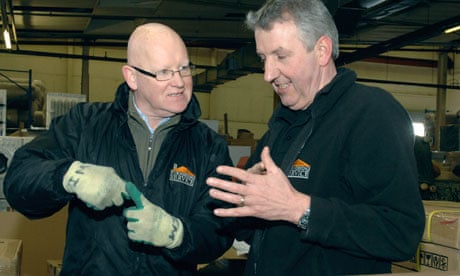After working at a Remploy sheltered factory for 15 years, Iain Muir now earns a market wage as a forklift driver at an East Kilbride warehouse. His profound deafness presents challenges, but nothing that cannot be overcome with support, understanding and a little sign language.
Muir, 50, is a full and valued member of staff at the Furnishing Service, a company supplying furniture and fittings to councils and housing associations across Britain. His experience shows that, given the opportunity, disabled people can cope perfectly well in "open" employment.
"I'm enjoying the job," Muir says. "My new colleagues are fantastic – they're really friendly and helpful, and lots of them are keen to learn to sign."
Not all former Remploy workers are so fortunate. Many of those who lost their jobs when the government agency shut 29 factories in 2008 have not worked again. The bitter row over the closure programme rumbles on, polarising views about the future of sheltered or protected workplaces, and the viability of expecting disabled people to compete in the open labour market.
An attempt will tomorrow be made to find common ground in the argument. At a conference in London, disability umbrella organisation Radar will present a discussion paper seeking to achieve consensus around what disabled people want from employment, and which models of employment are most likely to achieve it.
The paper, funded by Remploy but drawn up after consultation with a broad range of interest groups, including trade union leaders opposed to sheltered factory closures, sets out 10 propositions endorsed by a panel of almost 40 disabled individuals chosen from Radar affiliates.
These propositions start with a declaration that work "contributing to the economy" should always pay at least the minimum wage. Some sheltered jobs do not do so, often on the pretext that the role is for a trainee or intern. One worker quoted in the paper says: "I worked on a mobile gardening unit for 13 years. I didn't get paid. It was called work experience."
Perhaps the most contentious of the propositions asserts that "the continued existence of separate workplaces gets in the way of tackling bullying, harassment and discrimination". Inclusion of disabled people in mainstream workplaces is, it argues, the best way to counter stereotyping of disability through the promotion and enforcement of legal rights and good practice. Two of the panellists dissented from this.
There was no dissent, however, from a proposition stating: "In general, supported employment in mainstream workplaces better promotes social inclusion than specific, separate workplaces for disabled people." One interviewee quoted in the paper said: "Social inclusion happens when an individual is exposed to wider society, rather than simply being part of a small and separate community."
Liz Sayce, Radar chief executive and author of the paper, says that disabled people want decent pay, the status of a job, career security and development opportunities, social interaction and the feeling that they are respected and free from discrimination.
"We conclude that in general – though not for every individual – support in open employment or self-employment hits more of the key factors than do other options," Sayce says. "In our society, 'real' jobs are perceived as offering greater status than 'special jobs'."
This may be so, but are "real" jobs going to be available in the economic climate of the next few years? Only one in two disabled people of working age had a job before the recession kicked in; proportionally large numbers of those who are employed have jobs in the public services, which are about to shed hundreds of thousands of posts.
Peter Purton, disability policy officer at the TUC, welcomes the Radar initiative. But he warns that it would be "dangerous" to be seen to be contemplating closure of further sheltered factories – Remploy alone has more than 50 still open, employing 3,000 people – until the economy picks up.
"The reality is that [sheltered workplaces] provide decent, paid work for some thousands of disabled people who would not get employment anywhere else," Purton says. "It's better that they should be working, admittedly in subsidised jobs, than drawing disability benefits."
Even if the economic picture were to improve, Purton adds, disability discrimination in the labour market remains too big a problem to dispense with sheltered provision. He does not agree "for one minute" with the proposition that such workplaces get in the way of tackling the issue.
"We are all in favour of open employment for disabled people – if there was no discrimination," Purton says. "But there is discrimination and, therefore, people who lose their [sheltered] jobs are not going to get new jobs on the open market."
Sayce admits that, if history repeats itself, disabled people who lose their jobs in the downturn may take years to get back into work, if they ever do. But she implores policymakers to look at the big picture, including benefit costs. "If more disabled people are employed and progress in their careers, their social and economic contributions increase."

Comments (…)
Sign in or create your Guardian account to join the discussion